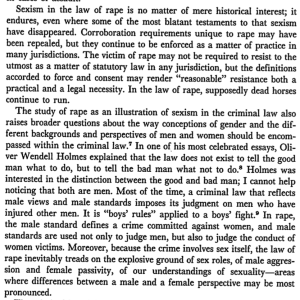The article “Rape” by, American feminist and lawyer, Susan Estrich was published as a part of the 1986 issue of “The Yale Law Journal.” This journal has “been at the forefront of the legal scholarship, sparking conversation and encouraging reflection among scholars and students, as well as practicing lawyers and sitting judges and Justices” (Yale Law Journal). [more context]
In this article calls attention to the sexism in rape law as a current and pressing issue stating, “sexism in the law of rape is no matter of mere historical interest; it endures”(1091). In the context of rape legislature Estrich discusses the ambiguity of words like “force” and “consent” and the notion these definitions are still in great part determined by the victims actions and response during the rape itself which leads to the victim being put on trial and taking the focus off of the rapist who actually committed a crime. Estrich writes, “the victim of rape may not be required to resist to the utmost as a matter of statuory law in any jurisdiction, but the definitions accorded to force and consent may render ‘reasonable’ resistance both a practical and legal necessity” (1091). As Estrich continues to write, “in the law of rape, supposedly dead horses continue to run” (1091). Estrich uses that bold imagery to demonstrate her strong resentment of this standard in law that puts the blame on the victims for not resisting in such a way that satisfies the court. The continuation of these legislative practices usher on a rape culture of victim blaming and violence against women.
Additionally there was no clear definition of rape in law during this period, leaving key concepts involved in rape decisions like “force” and “consent” discussed in this article to be defined by the male dominated criminal justice system and the patriarchy’s understanding of sexuality. “where differences between male and female perspective [about sex] may be most pronounced” (Estrich pg 1091).] As Estrich writes, “because the crime involves sex itself, the law of rape inevitably treads on the explosive grounds of male aggression, and female passivity” (1091). Traditional standards of heterosexual relationships strongly impact interpretation in rape cases but due to the male dominated justice system cases of rape are analyzed through the lens of the male standard of those relationships.

Work Cited
Ylj – about the Yale Law Journal, https://www.yalelawjournal.org/about-the-yale-law-journal.
Estrich , Susan. The Yale Law Journal – Yale University. https://digitalcommons.law.yale.edu/cgi/viewcontent.cgi?article=6999&context=ylj.
